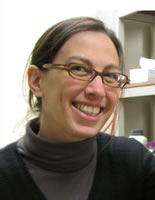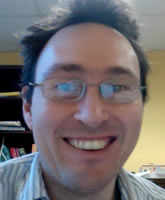 |
C O N F E R E N C E 12 May - 14 May 2011 |
Workshops
 |
 |
||
Dr. Cécile Fradin & Dr. Duncan O'Dell |
|||
Inquiry Physics Laboratories for Life Sciences Students |
|||
Recent changes to our physics laboratories for life sciences students reflect two goals: first, to move from a "recipe" format to an inquiry-based format in order to enhance students’ learning; and second to modify laboratory topics in order to show the relevance of Physics to the Life Sciences. We will briefly discuss the new laboratory format and topics that we settled upon and show the results of student surveys carried out as we implemented these changes. Participants will then have the opportunity to carry out one of the laboratory experiments themselves. |
|||
Cecile Fradin, Canada Research Chair in Molecular Biophysics, is an Assistant Professor with a joint appointment in the Department of Physics and Astronomy and the Department of Biochemistry and Biomedical Sciences. Cecile became interested in physics in high school and remembers being fascinated with light. She got her PhD in France in 1999, working on the structure of liquid surfaces, and then did a Post Doc at the Weizmann Institute of Science in Israel, where she worked on nuclear transport (the type that occurs in human cells!). She came to Canada in 2001 to start her own group at McMaster. Her research includes several different projects, which all have to do with fluorescence, and in particular how the use of fluorescence can help detect the motion of proteins in living cells. She continues to be fascinated by light! Cecile and some of her students were recently featured in a video in McMaster’s Spotlight on Science series, http://www.youtube.com/user/McMasterUTV#p/a/u/0/wguy1X_qXak, which captures her interest in the interface between physics and biology and her efforts to make physics more relevant and appealing to Life Sciences students. |
|||
Duncan O’Dell is an Assistant Professor in the Department of Physics & Astronomy at McMaster University. He is a theoretical physicist who does research in the area of quantum optics and ultracold atoms. On the teaching side, Duncan has taught a range of physics courses from the graduate level to first year introductory courses. For the past two years he has been the “physics guy” teaching in the new Integrated Sciences program (iSci) at McMaster. iSci aims to train a new breed of researcher capable of tackling interdisciplinary problems, e.g. climate change, and is taught by a team comprising biologists, chemists, Earth scientists, mathematicians and physicists. A second characteristic feature of iSci is that it is taught entirely through projects, i.e. problem based learning. Duncan has had a steep learning curve adapting to this mode of instruction, but it has given him invaluable insight into the way people learn. |
|||